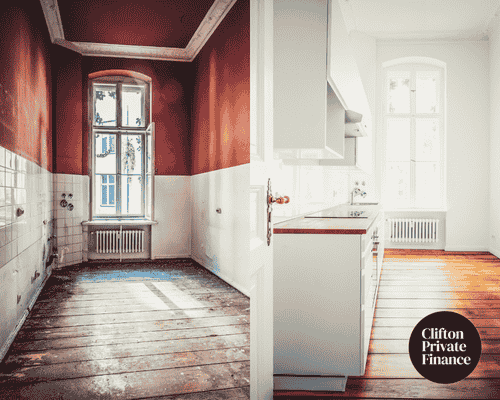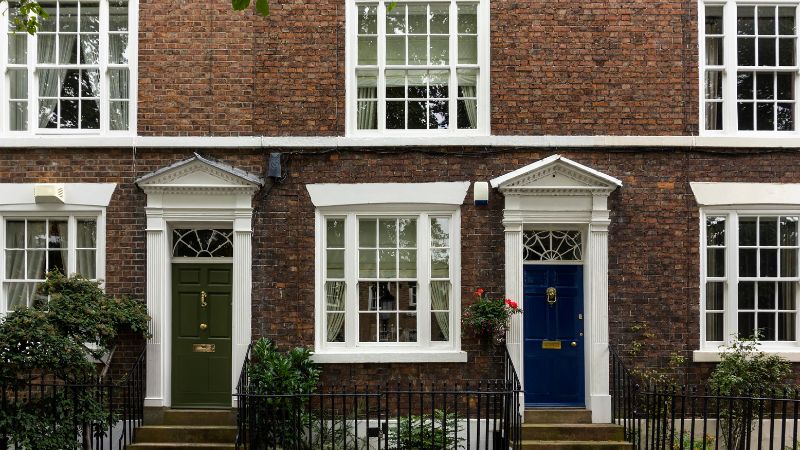Property auctions are an excellent way to get a property, whether you’re looking for a house in need of a little love to turn it into a perfect home, a bargain that’s below current market levels for investment or flipping, or a chance at a unique property that’s otherwise unavailable.
The opportunities that auctions present are significant and often exciting but there seems to be a barrier to entry: funding.
Bridging finance is the solution. With specialist products tailored for auctions, and a range of lenders keen to help those looking to make the most of auction opportunities, it can provide the funds you desperately need.
How does auction bridging work, and would you be eligible to use it? Let Clifton Private Finance provide the answer.
Get Your Free Bridging Loan Quote »
A Short Overview of Bridging Finance
Bridging finance is a short-term funding solution based on an exit strategy for repayment, rather than monthly repayments. It is often used for buying properties at auction and is expertly tailored to fit. Bridging is secured finance, using property as collateral - this can include the property you are purchasing, your current house you may be moving out of, and any other property you own equity in. By leveraging multiple properties, it is possible to secure considerable sums of bridging finance to buy auction property even if you have a poor credit rating or low mortgage affordability.
To understand more about the basics of bridging finance, consider our Guide to Bridging Finance.
Watch our video below about how we helped a client secure a property they'd bought at auction with a bridging loan:
Get Your Free Bridging Loan Quote »
Buying at Auction - Problems and Solutions
Obtaining a property at auction means moving quickly and efficiently, getting in before someone else snaps up the bargain. Bridging finance is the best funding to meet the demands of this unique environment.
Problem: Property is unmortgageable
There’s no restrictions regarding the type of properties that can be sold at auction, which makes it the central marketplace to sell homes that are in desperate need of work. Mortgage lenders have comprehensive rules regarding the suitability of a property for habitation that means there are many situations which render a house ‘unmortgageable’ - from the lack of a kitchen to the spread of damp. Given the huge range of auctioned properties, it is no surprise to realise that many of them fall into this undesirable category - of course, that just makes them even more a bargain for the right buyer.
An unmortgageable property is simply one that the mortgage lender is unhappy to consider as security for a long term loan - and promises that you’re going to put in the work renovating the house to turn it into a shining modern home are not reassurance enough. Mortgage lenders need to see that the work is done, not just that you have plans to do it.
Once that’s done, a mortgage company will be happy to finance you for the long term, allowing you to pay off the bridging finance in full and move to monthly repayments.
Solution: Bridging finance with a budget for renovation provides everything needed.
Problem: Mortgage finance is slow
UK auction house rules are clear: payment in full must be made within 28 days. Unfortunately, this makes using a mortgage impossible for all but the very lucky. Mortgages can rarely be put in place within a four week timeframe and there’s never a guarantee that this can be done, putting your considerable 10% deposit at risk.
By contrast, bridging finance is very quick. Even the slower form of regulated bridging finance (required if you plan to live in your auction property) can be obtained in time, giving you the cash you need to pay the remainder of the property cost before the deadline.
Solution: Both regulated and non-regulated bridging finance can be obtained in time.
Problem: Planning permission is required
You may be looking to auctions to buy land to build on, or property that you plan to make significant changes to. In these cases, planning permission is essential to secure long-term finance and may not be finalised when the property goes under the hammer. Bridging finance has the flexibility you need to obtain funding first, and planning permission second, giving you the opportunity to take advantage of a low guide price for a major return on investment once the paperwork is all in place.
Solution: Bridging finance provides the flexibility to make well-informed calculated risks.
Problem: Development is planned
Most mortgages and long-term lending is based on the current market value of the property, with no room for larger development budgets to make the most out of land and property sales where large-scale redevelopment is planned. With the right business plan and security, bridging finance can be secured that is based on the GDV (Gross Development Value) of the future development rather than the current market price, giving access to greater levels of funding and the flexibility for refinancing through specialist development finance at a later stage.
Solution: Short-term bridging finance may open opportunities for development based on value forecasts.
Problem: Temporary issues with affordability, income, or residency
Mortgage affordability checks, stress tests, and reliance on UK credit history can cause problems for many potential property buyers. Because bridging finance is based on the viability of your exit strategy, whether that be refinancing or the sale of property, there is a smaller focus on credit scoring and income-based affordability testing. This provides the flexibility needed to make the property purchase and settle as necessary before moving to alternative funding.
Examples include:
- Buying property with a temporarily poor credit score.
- Moving to the UK from another country as a returning expat.
- Investing in UK property for a foreign national.
- Moving home for a new job.
- Moving with expediency due to relationship changes.
Solution: The flexibility of bridging finance offers alternative assessment criteria for funding.
Problem: Buying at auction while waiting for an existing home to sell
Being at the end of a property chain can mean your funds are tied up in your existing home while you look at an auction property as your new house. This can be extremely frustrating, as you know the money is there in essence, it’s just tied up waiting for your buyer to complete.
Short-term bridging finance can be secured against your existing house as security, and its sale forming the exit strategy, giving you the power of a cash buyer at auction.
Solution: Bridging finance releases tied-up capital for immediate use at auction.
Get Your Free Bridging Loan Quote »
Bridging Finance for Auctions - The Process
Getting auction finance is simple when you partner with a specialist bridging finance broker like Clifton Private Finance. The process from application to completion is as follows:
- Speak to Clifton Private Finance - Getting the right auction bridging finance is best done with specialist help. At Clifton Private Finance, we have the expertise and the connections you need to find a suitable lender and secure a great deal.
- Work out Exit Strategy - One of the most important parts of auction finance is planning your exit strategy, whether that’s a later mortgage, or sale of property. We’ll help you get that clearly defined and ready for presentation to the lenders.
- Apply for Bridging Finance - Working together, we’ll help you put together the application, with all paperwork in place to make the whole process smooth. At CPF, we pre-approve your loan, going through every scenario to make sure there are no nasty surprises.
- Wait for Valuation - A valuation of the property will be undertaken, which will form the basis of the security and determine loan size and terms.
- Receive Offer - Once you are approved, the lender will make an offer. This will outline the loan sum, interest rate, fees, and exit strategy. If this meets your needs, you can agree immediately.
- Completion - With the loan approved, you can purchase the auction property. With bridging finance, the time from application to completion can be extremely quick, ensuring you are well within that auction deadline.
- Repayment - Once the exit plan comes to fruition, pay the bridging finance back immediately. The sooner the better as there are no early repayment charges and you only pay interest on the time you have the loan.
When to Go to Auction
Do you need the bridging finance in place before you bid on an auction property? The answer is no, and often bridging finance is secured when enthusiastic property investors have already put down their deposit! That’s not a problem though - with our expertise, we can get your bridging finance approved and the money cleared within a few weeks.
Of course, you may feel more confident going into the auction process with the preliminaries in place. If you speak to us at the early stages of your auction plan, we can make sure you have everything in place before you bid. However, as bridging finance is secured against the property and auction purchases are not guaranteed - you may be outbid! - the final application is completed once the purchase is set.
Get Your Free Bridging Loan Quote »
Auction Bridging Finance FAQs
Q: Do I need good credit to get auction bridging finance?
A: No. Bridging finance is secured finance that uses property as collateral. This means your credit rating is less important than for a mortgage or unsecured personal loan. However, if your exit strategy is based on long-term financing, such as a mortgage, then your credit history will be considered as part of the exit plan. Speak to a Clifton advisor to discuss specialist bridging finance if you are worried about the impact of your credit score.
Q: Can I get auction bridging finance without a deposit?
A: Yes. Bridging finance can be secured against multiple properties to effectively provide a 100% LTV loan against the auctioned property.
Q: Do I need to own a home to get bridging finance for an auction?
A: No. You can secure bridging finance entirely against the property you are purchasing at auction up to 80% LTV. You will, however, need a deposit to cover the remaining investment.
Q: When should I apply for auction bridging finance?
A: If you are considering looking at auction properties with bridging finance, it is advisable to speak to one of our team as early as possible, though bridging finance can be put into place rapidly and effectively, making it perfect to cover your capital needs if you have already put a deposit down at auction.
Q: What does auction bridging finance cost?
A: Bridging finance comes with monthly interest costs as well as arrangement and broker fees. For a full understanding on the costs of auction finance, read our companion article: The Cost of Bridging Finance
Q: Can I use bridging finance to buy rundown property to renovate?
A: Yes. Bridging finance is perfect for flipping houses and snapping up bargain properties with a view to renovating before moving in or renting out. With the right security, auction finance can cover the cost of purchase and the renovations in one clear funding package.
Q: Does auction bridging finance cover all costs?
A: Yes. It is possible to roll all costs, including interest, into the bridging finance sum, to be repaid once the exit occurs.
Auction Bridging Finance with Clifton Private Finance
Our bridging finance team at Clifton Private Finance is here to help you navigate the complexities of the auction process so you can take advantage of the opportunities it presents. Don’t wait to invest in the UK property marketplace - whether you’re looking for a new home or an exciting renovation project, Clifton Private Finance have the funding solution for you. Contact us today.









.jpg)










